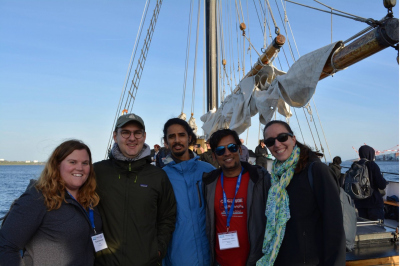- ArcTrain
- Research stays abroad
- Research stay at UQÀM (J. Saini)
Research stay at UQÀM (J. Saini)
May 21 - July 10, 2018, Montreal, Canada
Summary:
I stayed about 7 weeks at the GEOTOP/UQÀM in Montréal, Canada. The GEOTOP is a research centre within UQÀM for geochemistry and geodynamics at the Earth Sciences department which cooperates with other institutes from several universities in Montréal (i.e. McGill University). I have been supervised by Prof. Dr. Anne de Vernal and Dr. Jeans Heile Francois.

The aim of this stay was to analyze the stable organic carbon and nitrogen isotopes (δ13Corg & δ15Norg) of the several cores from Melville Bugt, Baffin Bay. Stable carbon isotopic δ13C of organic particles have been used to understand marine ecological and depositional processes as well as to estimate relative proportions of marine and freshwater source of organic carbon. δ13C (and δ15N) gives accurate estimation of relative carbon deposition i.e. marine vs. terrestrial that is essential for understanding global carbon cycle. This then i could use in combination with my IP25 and PIP25 biomarkers to reconstruct the sea-ice variability of this region for late glacial and Holocene in more detail.
So, I tried to make the best of it all and used the opportunity to discuss my results with my supervisors. I did some tests at GEOTOP for the simultaneous measurements of δ13Corg & δ15Norg that was not done before due to different amount needed for stable isotopes respectively. But luckily we were able to that in two priority cores (GeoB19927 & GeoB19948) within the correct limit of detection. Therefore, we manage to successfully done the stable isotope measurements of these two sediment cores (GeoB19927 & GeoB19948) for δ13Corg & δ15Norg. I also would like to thank Agnieszka Adamowicz-Walczak for her support in the lab work. We also had a chance to discuss these new results with Anne de Vernal and Claude Hillaire-Marcel. Their input was very insightful in interpreting the multi-proxies.
I also had the opportunity to attend CMOS conference/workshops at Halifax 2018 in the east coast of Canada. Here, I had more discussion about my results with Anne and other ArcTrain-Canada colleagues. During this conference I was able to meet lots of scientists across different disciplines working in the Arctic, as well as attending different workshops about successful interview skills and publication and research proposal writing.
When i arrived it was already early summer, and it is said to get sometimes very hot like 37˚C in summer. But due to heat waves, I experienced already very hot weather in Montreal where it was 38˚C humidex. So I’ve experienced the real summer in Quebec.
So in general, the research stay at the GEOTOP in Montréal was a very inspiring and exciting experience for me. I liked the old Quebec city too. Montréal is a very international, joyful and colourful city and it was nice to meet again the Canadian ArcTrain students and PIs.
I would like to be thankful for ArcTrain for giving me this great opportunity, guidance and funding resources.


